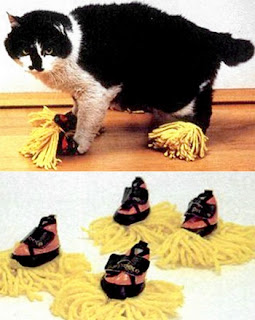Writing about music is like dancing about architecture.
Attributed to Martin Mull (and several others), this simile conveys the point well and even tempts you to try to express yourself this way.
On the other hand, today I heard:
In order to think like a graphic artist you have to think outside the box.
Think outside the box is a cliche and, as such, expresses thinking within the box and not even your own box, at that.
Think outside the box. What does it mean anyway? If you want to say unusual, unconventional, abstract, counter-cultural, experimental or imaginative, then say so. Words have a clean, freshly-minted quality about them. Hackneyed phrases have baggage. They look the part and then you notice the tired lines under make-up.
Think outside the box. Starting with that phrase.
Why drown in information when you could be swimming? MyInformationCoach for the training, tools and techniques to save time and stress less.
Friday, November 23, 2012
Saturday, November 17, 2012
Two thoughts separated by 140 years
Friday, November 9, 2012
News flash: Cat mops don't work.
"Chindogu", are the weird and wonderful inventions from Japan. They provide solutions that are simultaneously ingenious and ridiculous. The creativity is admirable, but you wouldn't really do it that way...would you?
Wrong. People, in fact, many people, really do. When bad practices produce spectacularly observable bad outcomes, they get fixed. If the outcome is bad but not spectacularly observable, it is remedied with a shrug of the shoulders. Plane and train crashes lead to commissions of inquiry. Office workers sitting in uninspiring meetings do not.
As organisations form and grow, the design, storage and sharing of information are left to the information technologists. While IT provide many excellent solutions, it doesn't end there. Users should optimise their interaction with all of the IT solutions they are using. Many don't know how to do this.
If the additional IT solution is one or two or more too many, it creates additional work without additional productivity. If it results in a pilot or a train driver crashing, it gets fixed. We have processes for that. But in your office...(shrug shoulders now).
My Information Coach is about promoting understanding and providing practical solutions to how you perceive, process and interact with the world. The focus is not on information or software, but on you. With the right training tools and techniques, your results will be better. Moreover, you won't be using "cat mops" to clean your floor!
Wrong. People, in fact, many people, really do. When bad practices produce spectacularly observable bad outcomes, they get fixed. If the outcome is bad but not spectacularly observable, it is remedied with a shrug of the shoulders. Plane and train crashes lead to commissions of inquiry. Office workers sitting in uninspiring meetings do not.
As organisations form and grow, the design, storage and sharing of information are left to the information technologists. While IT provide many excellent solutions, it doesn't end there. Users should optimise their interaction with all of the IT solutions they are using. Many don't know how to do this.
If the additional IT solution is one or two or more too many, it creates additional work without additional productivity. If it results in a pilot or a train driver crashing, it gets fixed. We have processes for that. But in your office...(shrug shoulders now).
My Information Coach is about promoting understanding and providing practical solutions to how you perceive, process and interact with the world. The focus is not on information or software, but on you. With the right training tools and techniques, your results will be better. Moreover, you won't be using "cat mops" to clean your floor!
Wednesday, November 7, 2012
Remembering what it is like to not know
Take, for instance, the telephone. If you were to teach someone to use one - what would you include? This link to Chris Wild's excellent Retronaut blog shows you some of the things you could include. Did you include "Find The Number First" or "Concentrate While Telephoning"? Probably not.
If some of the suggestions - specifically "Starting a Telephone Talk" - seemed quaint, consider this: "When the telephone appeared in the 1870s, people worried about receiving calls from people to whom they had not been properly introduced. And what should one say when picking up the receiver? Alexander Graham Bell, the inventor of the telephone, suggested “Ahoy, ahoy”. But as in many other respects, his ideas lost out to those of Thomas Edison, who preferred “Hello”, an expression that was rarely used before the telephone but is now ubiquitous."
"In 1903 the trade journal Telephony reported an elderly woman's complaints about her niece, who received a phone call from a male friend while dressing. “The two of them stood talking to one another just as if they were entirely dressed and had stopped for a little chat on the street! I tell you this generation is too much for me,” she grumbled."*
When informing or innovating, close collaboration with the ignorant may be your best resource.
* Source: The Economist Print Edition 13th December 2007.
Subscribe to:
Posts (Atom)



